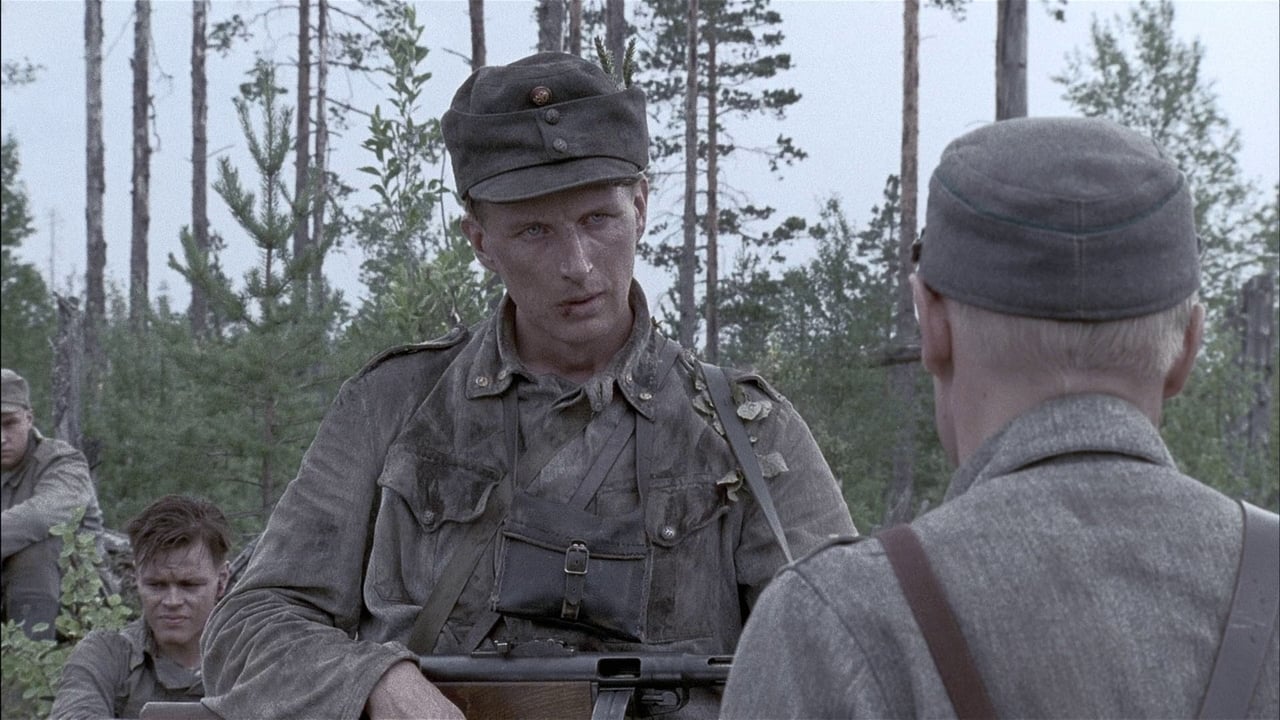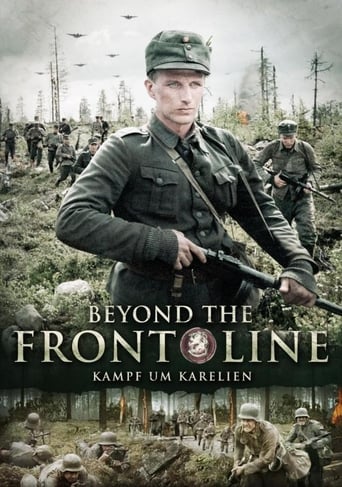

This is a must-see and one of the best documentaries - and films - of this year.
... View MoreWhile it doesn't offer any answers, it both thrills and makes you think.
... View MoreThe movie turns out to be a little better than the average. Starting from a romantic formula often seen in the cinema, it ends in the most predictable (and somewhat bland) way.
... View MoreIt's a good bad... and worth a popcorn matinée. While it's easy to lament what could have been...
... View More..he doesn't understand German and watching a movie in a language he does not understand might be funny, but only if he was with a group of friends who do not understand it either and have around the same level of mildly intoxication as he had.But Henry was neither intoxicated nor with a group of friends, but only accompanied by Kristl, who can understand German very well, her being Austrian, and that makes for one hell of a disadvantage in a review.So here follows a review written by Kristl.It was not easy to find this movie on the IMDb as the movie I saw was called 'Beyond the Frontline. The Battle for Karelien' instead of 'Beyond Enemy Lines'. Despite the English title the movie was voiced in German and I am unsure if there were any English subtitles so I question if it would be of any use to an English audience.This movie is from Finland and depicts remembered events from the war between Finland and the Soviet Union that coincided with the Second World War. I say remembered events because at the beginning we see a pair of grizzled veterans adorned with medals talking about that war with a young woman, who seems to be writing down their stories. It is their recollections thus that we are witnessing. I also say remembered, because a movie like this is more about what people remember then about what actually happened. Someone once said that of all the evidence one can submit to court, personal memory is the least trusted because people tend to recall things in a subjective manner and thus memories can be - and often are - changed because of wishful thinking, peer pressure, trauma and self delusion.The movie shows us the times and trepidations of a group of volunteers that are part of the infantry regiment 61, a Swedish volunteer unit in the service of the army of Finland. It is mid 1944 and the Soviets are on the move. Their aim is to advance through the Karelian Isthmus and thus gain access to the more open lands beyond. Karelia was an area hemmed in between the gulf of Finland and Lake Lagoda. It was an inhospitable land, with few roads and a lot of lakes and forests. A land more suitable to the defense than to conquest. Hence the Finish decided to make their stand there and with the aid of German (anti-tank) weapons, some German troops and volunteers from countries like Sweden, the Fins managed, for a while, to halt the Russian onslaught, which included tanks, massed artillery and sizable infantry forces.In itself this subject could be quite interesting as it shows a part of World War II of which not much is told and, to be honest, I feel some sympathy for a small country facing a big one such as the Soviet Union, even if Finland happened to be on the wrong side in the war.The challenge for a director working in such small country as Finland is to somehow make his movie interesting while lacking a sizable budget. Such a movie inevitable can only do this by substituting quantity for quality which means: using good acting, a well written script and camera-work to offset the lack of three b's, being: big boys, loud bangs and bouncing boobies.This movie only partially succeeds. The problem lies with the lack of story. This movie is like a drawn-out dramatized documentary that focuses on warfare and assumes that simply moving forward through time is enough of a plot device to keep people interested. It lacks drama and the personalities thus are flat. This is underscored by the fact that none of the soldiers seem to get worse for wear. They remain clean shaven and properly dressed despite the chaos of war. It is as if they are playing at warfare instead of actually undergoing it.Another problem with this movie is that the soldiers are sometimes too much cast as 'heroes'. The Russians, being the enemy, are depicted as the usually non-entities whose only role is to get killed in droves. At one moment a group of seven volunteers infiltrate a Russian position killing thirty soldiers. During this fight three 'heroes' manage to survive the blast of three hand-grenades with barely a scratch while the Russians fly through the air when the favor is returned. And when two battalions of Russians soldiers take on a company of these Swedish volunteers, the latter hardly suffer any losses at all, while the first get exterminated. It is all a bit too much.Why is it that in movies 'our side' is superior in all respect except for the amounts of men, of course, while 'their side' consists of a multitude of carbon copy dregs that can't shoot straight? Does a movie become less of a movie when the enemy is not just a shadowy figure in a landscape, but a person, like you or me with an equal fair change to kill one of us, as we have to kill one of them? Is it more heroic that a man, portrayed as superior in every respect, kills one who is inferior in everything? Is that what a 'hero' is?The bottom line is that this movie is interesting because it depicts events that I have not heard much about, but if the Swedes and Fins had been American soldiers and the context had been a battle in Western Europe like say, the battle of the bulge or the landing in Normandy, I would not have given this movie a second glance. And thus the final verdict. An interesting movie but not very impressive.
... View MoreLindman's film shows a story of a Finnish platoon leader Harry Järv, who during the Fenno-Russian War of 1941-44 led several successful raids against Russian strongpoints. Instead of any artistic ambitions, Lindman has meant his movie to be a true-story documentary about one historical person. While the film is a documentary drama, it lacks the horror and excitement one could expect from a war film. This approach has its reasons, because the film starts from the period of war during which only small-scale action was carried out between Finns and Russians. The action in the Finnish front during period of 1942-43 mostly consisted of Finnish patrols making havoc at the Russian lines, Russian snipers annoying Finnish watchmen and such.The Finnish platoon leader Harry Järv appears in the film as one of the most valiant soldiers there could be. He is not only good soldier. He is also cultivated. He reads classical philosophy and is eager to share his knowledge with his men. As a platoon leader he is unlike those USMC centurions, because he leads by his example. He never says "go!" but "come!". He speaks with his officers and men both Swedish and Finnish.I call this film propaganda only because it is so clean, although faithful depiction of actual events. Lindman has had an intention to teach the Swedes about war and explain why Soviet Union did not end up as a new neighbor for Sweden. It was rather geography and not politics at all that dragged Finland into the war! It should be admitted, that there was much worse in war, more blood and screaming, and all of the Finnish officers were not like Järv. There was however, plenty enough like him.As a whole, this is a unique film. Not great, but good and serves well all those who want to know about history. Framom främstä linjen has many little details that didn't surface up during watching it for the first time. I only began to like the movie only after watching it for the fourth time. For weapon freaks this movie offers a real rarity: the German StuG IIIg appearing at one scene. The DVD should have had a commentary and/or trivia track, because only Finns are enough familiar with their history and nature of their army.
... View MoreI liked this film for it's document-like story telling, and the fact that two veterans: Järv himself and another man from the same unit were involved in making it, as advisor's. This shows in true story told exactly right and in the way death is described and fake blood is not spared on the wounded.Järv's own photographs - taken by himself with the camera he carried with him in the war - are shown as he takes them in the film, and some black and white documentary clips are added to remind the viewer, this war really did happen. It's a nice touch, and a brave move, which could've flopped the movie. But it works.What I didn't like, was that Rambo-style Super Soldier Heroism shown on some battle screens. Also Russian head on attacks are quite common in the film: "Don't use the trees or dive for cover! Just run at them! CHAAAARGE!" Then again. Soviet's were known to use such tactics (especially early in the war). Järv's groups heroic raids on enemy positions are also a fact of history.I will comment Triathlonwest's earlier comments, to correct a few facts. First of all Soviet Union didn't attack Finland in The Winter War because "Russia needed land around Stalingrad to defend the city against possible German attacks" - as Triathlonwest stated. There's plenty of land around Stalingrad. They demanded a buffer zone for LENINGRAD. Soviet Union also demanded Finland's nickel mines at Petsamo, and several military bases inside Finnish borders, and close to the capital Helsinki, which would've basically given the Soviets free pass to enter the city, if war would've been later declared. And to this comment: "The reason the Fins lost territory to the Russians were their stubbornness and refusal to compromise". Behind the scenes, and before Winter War (or the Russo-German war), the Soviets had a pact with Germany (The Molotov-Ribbentrop Pact) to share Europe between them. Germany would get Western and Central Poland, and Western Europe, while Soviet Union had "claims" on Eastern Poland, Finland, Estonia, Lithuania and it's other western neighbors. So the war would've most likely started even if Finns would've accepted Soviet demands. Out of all countries included in this pact only Finland remained independent during and after the war. All thanks to Finnish stubbornness.
... View MoreI am a collector of movies about war and this film is a must have. I got some other titles about the Finnish winter war and i love them. The last weeks i have been sweeping the Internet for someone that sells the movie but with no luck. Well, i guess ill have to keep searching for it then. I recommend some other titles about the war in Finland during the WW2."Winter War" http://www.imdb.com/title/tt0098437/"Ambush" http://www.imdb.com/title/tt0162625/These are two very good movies that i really recommend to watch.
... View More